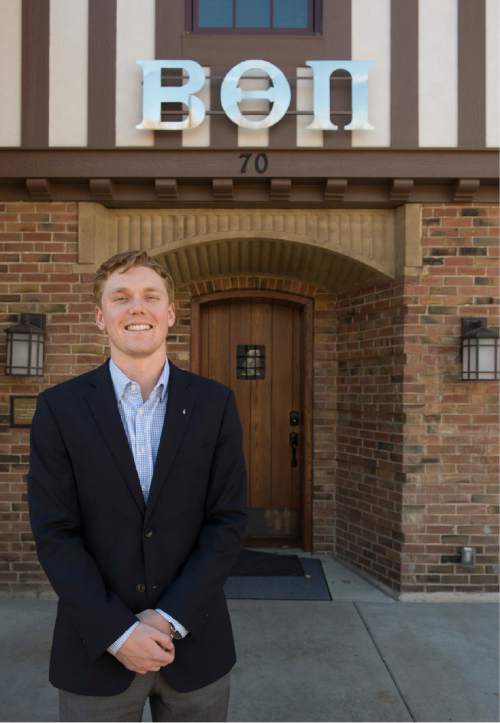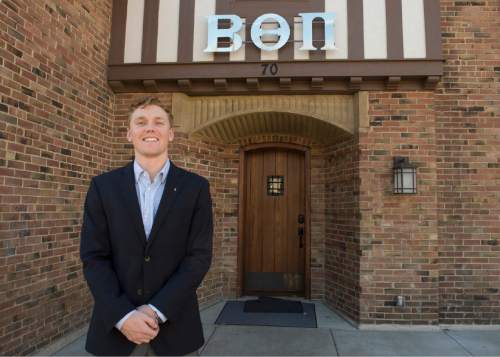This is an archived article that was published on sltrib.com in 2014, and information in the article may be outdated. It is provided only for personal research purposes and may not be reprinted.
Few fraternities are known for helping prevent sexual assault.
A University of Utah chapter is hoping to buck the trend, and it just won $3,200 to dedicate to the effort.
Beta Theta Pi recently received the grant to put toward its campaign against rape on campus and in Salt Lake City.
"Unfortunately, it is an issue that happens on our campus." said Mitchell Cox, president of the University of Utah chapter and a psychology graduating in December. "Men have to be the ones to step up and stop it."
Tiffany Thorne, the director of SlutWalk SLC, agrees.
"You guys have a really important and huge task on campus," she said in a panel on sexual assault hosted by the fraternity Thursday. And it starts, Thorne said, with the guys rethinking how they use the word "rape" in casual conversation.
When Thorne admonishes men, saying "No, you didn't just get 'raped' in that video game," she said, it has little effect. "But if I have a male friend stepping in and saying, 'You can't do that. That's not cool,'" she said, "It immediately shuts down."
The Betas' effort comes as a University of Virginia fraternity has come under the spotlight after Rolling Stone reported a case of gang rape there. The magazine has since acknowledged inconsistencies in the account, but the issue of sexual assault on college campuses remains.
The Robin McGraw Revelation Foundation, Students of the World and Pivot Television awarded the money to the U. chapter.
Last year, Utah's flagship school of roughly 30,000 students logged 10 cases of "forcible sex assault" on campus, twice as many as the year before. Five of the 2013 assaults took place in on-campus housing, the most recent crime report shows. Six more occurred either on campus or on "public property."
Cox and other chapter leaders started working with Salt Lake City's Rape Recovery Center about a year ago, when a Beta alum suggested they focus their philanthropic efforts there. The fraternity has worked with the center to launch prevention programs on the University of Utah's campus for anyone to attend.
In years past, much talk of preventing rape has focused on what women should do — watching how much they drink or avoiding attending parties alone, for example.
Cox says he and his fraternity brothers are trying to get the word out that it's up to men to curb sexual assault. Their message echoes a national chorus from a White House task force: If she doesn't consent, or if she's too drunk to consent, it's rape. If you think someone is in danger of being assaulted, step in.
University of Utah President David Pershing says he tells students to look out for one another.
"The big thing I say to every student I talk to is: Go to parties with a friend. Do not leave your friend at a party," he said recently.
In talking with men on campus, "I say, watch what your friends are doing."
Holly Mullen, executive director of the Rape Recovery Center, praises the Betas' effort.
"I think they're trying to be proactive about some of this stuff and get ahead of it before it becomes a problem," she said. "We have to just keep sending this message out: It has to be enthusiastic consent."
The numbers indicate that the vast proportion of rape and sexual assaults are not reported, said Mullen. A 2007 state survey found that one in three women over 18 in Utah is sexually assaulted.
The Beta fraternity has raised about $9,000 for the Salt Lake City center in the past year. A member of the fraternity also attends the center's board meetings.
Next week, the fraternity's forums continue with a panel discussion on Thursday. The chapter wants to work more closely with university administrators and more student groups, but leaders still are hammering out the details on how to spend the grant.
Beta members say they are taking other proactive steps on their own turf. Like many of their counterparts nationwide, the brothers hosted a recent formal that included an overnight stay for members and their dates. About 150 people attended.
In the weeks beforehand, chapter leaders took the advice of various sorority presidents on campus by making it clear that women who would be attending the event weren't expected to share a bed with their dates at the ski resort where the formal took place. Any who would rather sleep in an all-girls room, they said, had an option to do so. The separate space was available that night for anyone who was made to feel uncomfortable.
Cox said the measure was a precaution, even though he felt confident his fellow members would behave in a dignified way.
In 2010, the fraternity's national office in Ohio pulled the Utah chapter's charter, citing years of bad behavior, including noise complaints and "illegal behavior." It did not mention sexual assault.
The U. chapter started up again a year later and is now "dry," meaning no drinking is allowed at the house.
Mullen calls the Betas' effort a good start, but said more initiatives should be geared at male college students and others their age. "I really want to see so much more done with young men," she said. "There's no reason to allow sex to happen without consent." —
Sexual Assault Prevention Forum
o 3 p.m. Thursday • Panel discussion with sexual assault survivors, students and therapy specialists at the David Eccles School of Business' Spencer Fox Eccles Building.





